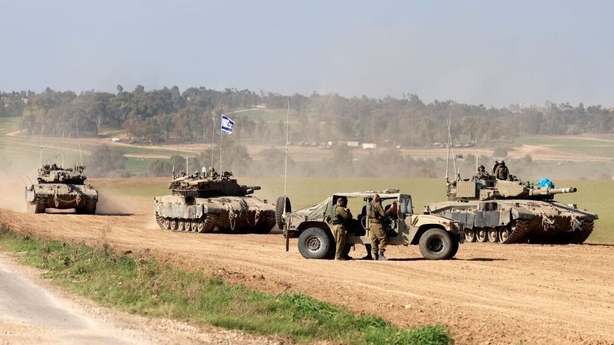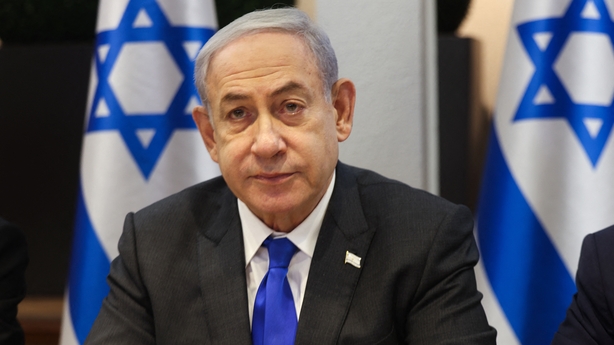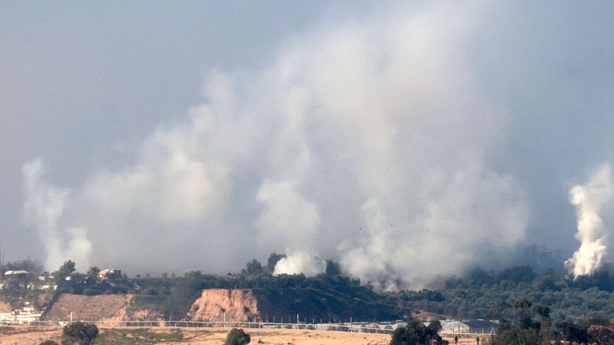Israeli jets intensified attacks on central Gaza today, residents and medics said, as battles raged through the rubble of towns and refugee camps in a war that Israeli Prime Minister Benjamin Netanyahu said would take "many more months" to end.
Mr Netanyahu's comments signal no let-up in a campaign that has killed many thousands and levelled much of Gaza, while his vow to restore Israeli control over the enclave's border with Egypt raises new questions over an eventual two-state solution.
Air strikes pounded al-Maghazi and al-Bureij in the centre of Gaza, killing 10 people in one house and driving more to flee to Rafah on the border with Egypt from front lines where Israeli tanks are battling Hamas fighters.
A Red Crescent video published today showed rescuers working in the dark to carry an injured child from smoking rubble in central Gaza. Six people died in a strike on the village of Al-Mughraqa outside Gaza City, health officials said.

As 2023 drew to a close, Palestinians in Gaza prayed for a ceasefire but had little hope the new year would be better.
"In 2024 I wish to go back to the wreckage of my home, pitch a tent and live there," said Abu Abdullah al-Agha, a middle-aged Palestinian man whose house in Khan Younis was destroyed and who lost a young niece and nephew in an air strike.
The stated goal of Israel's military is to eliminate Hamas, the Palestinian militant group that launched a surprise cross-border assault on Israeli towns on 7 October, killing 1,200 people, mostly civilians, and grabbing 240 hostages.
Israel's air and artillery bombardment has killed more than 21,800 people, according to health authorities in Hamas-run Gaza, with many more feared dead in the rubble, and pushed nearly all its 2.3 million people from their homes.
We need your consent to load this rte-player contentWe use rte-player to manage extra content that can set cookies on your device and collect data about your activity. Please review their details and accept them to load the content.Manage Preferences
Palestinian health ministry casualty figures do not differentiate between fighters and civilians but the ministry has said 70% of Gaza's dead are women and under-18s. Israel disputes Palestinian casualty figures and says it has killed 8,000 fighters.
Israel blockaded most food, fuel and medicine after the 7 October attack. It said today it was ready to let ships from some Western countries deliver aid directly to Gaza's shores after security checks in Cyprus.
Gemma Connell, an official with the UN humanitarian agency OCHA, said many of the tens of thousands of people fleeing to Rafah had no possessions and nowhere to sleep.
"I just am so fearful that the amount of deaths that we've been seeing is going to increase exponentially both because of this renewed offensive but also because of these conditions which are literally unbelievable," she said.

The United States, Israel's main ally, has urged it to scale down the war and European states have signalled alarm at the extent of Palestinian civilian suffering.
However Mr Netanyahu's comments yesterday, when he said he would not resign despite opinion polls showing his government is broadly unpopular and defended his security record despite the 7 October attack, indicate there will be no easing any time soon.
He said the "the war is at its height" and Israel would have to retake control of Gaza's border with Egypt - an area now crammed with civilians who have fled the carnage across the rest of the enclave.
Retaking the border could also constitute a de facto reversal of Israel's 2005 withdrawal from Gaza, raising new questions over the future of the enclave and prospects for a Palestinian state.
Israel's hard-right finance minister Bezalel Smotrich fuelled concerns about the offensive's aims today by calling for Palestinians to leave Gaza and make way for Israelis who could "make the desert bloom".
That clashed with the official Israeli government position that Gazans will be able to return to their homes.
Mr Smotrich and other hardline coalition ministers have been excluded from the core war cabinet, but have pushed to take part in decisions about the conflict.
In his last comments as Israeli Foreign Minister before switching to the energy portfolio today, Eli Cohen said the border was the likely source of weaponry Hamas had obtained over recent years.

Senior Palestinian Authority official Hussein al-Sheikh in the Israeli-occupied West Bank said via social media that Israel taking over the border was evidence of a decision "to completely return the occupation".
"We moved here from Khan Younis on the basis that Rafah was a safe place. There is no space in Rafah as it is overcrowded with displaced," said Umm Mohammed, 45, a displaced Palestinian woman sheltering by the border.
"If they control the border, where will people go?" she asked, saying this would be "a disaster".
In a statement issued this evening, President Michael D Higgins said: "We cannot be indifferent as we watch daily the loss of life that is appearing on our screens.
"The awful loss of life which we have witnessed in recent months has led to a broad re-statement of the need for a two-state solution.
"However, for this to have meaning, there is a need to move beyond a theoretical commitment and for detailed consideration to resume of the specific details of how this can be achieved.
"It is my hope that it will not be long until the international community comes together to commence the serious, crucial negotiations that will be needed in the time ahead," said Mr Higgins.
Maersk cargo ship comes under attack
The war risks morphing into a wider regional conflict involving Hamas ally Iran and groups Tehran supports across the Middle East.
Israel and Lebanon's Iran-backed Hezbollah have exchanged regular cross-border fire, with the Israeli military saying it struck targets in Lebanon today. Israel has hit Iran-linked targets in Syria. And Iran-backed groups have attacked US targets in Iraq.
Yemen's Iran-aligned Houthi group, which has been attacking shipping in the Red Sea for weeks in what it calls a response to Israel's war in Gaza, attacked a Maersk cargo ship yesterday and today, the US military said.
US naval helicopters sank three of the four small boats the Houthis had used in today's attack and drove the fourth back to shore, the military said.
The US said it also destroyed anti-ship missiles operated by the Houthi rebels after a failed attempt by the Iran-backed group to board a container ship in the Red Sea.
Shipping giant Maersk suspended the passage of its vessels through the key Red Sea strait for 48 hours after its ship was targeted, the latest of two dozen attacks by Houthis on international shipping in six weeks.

